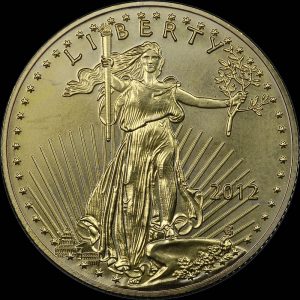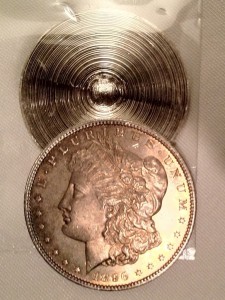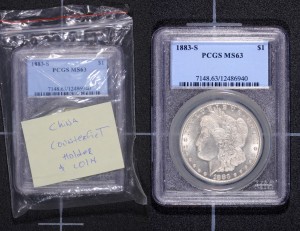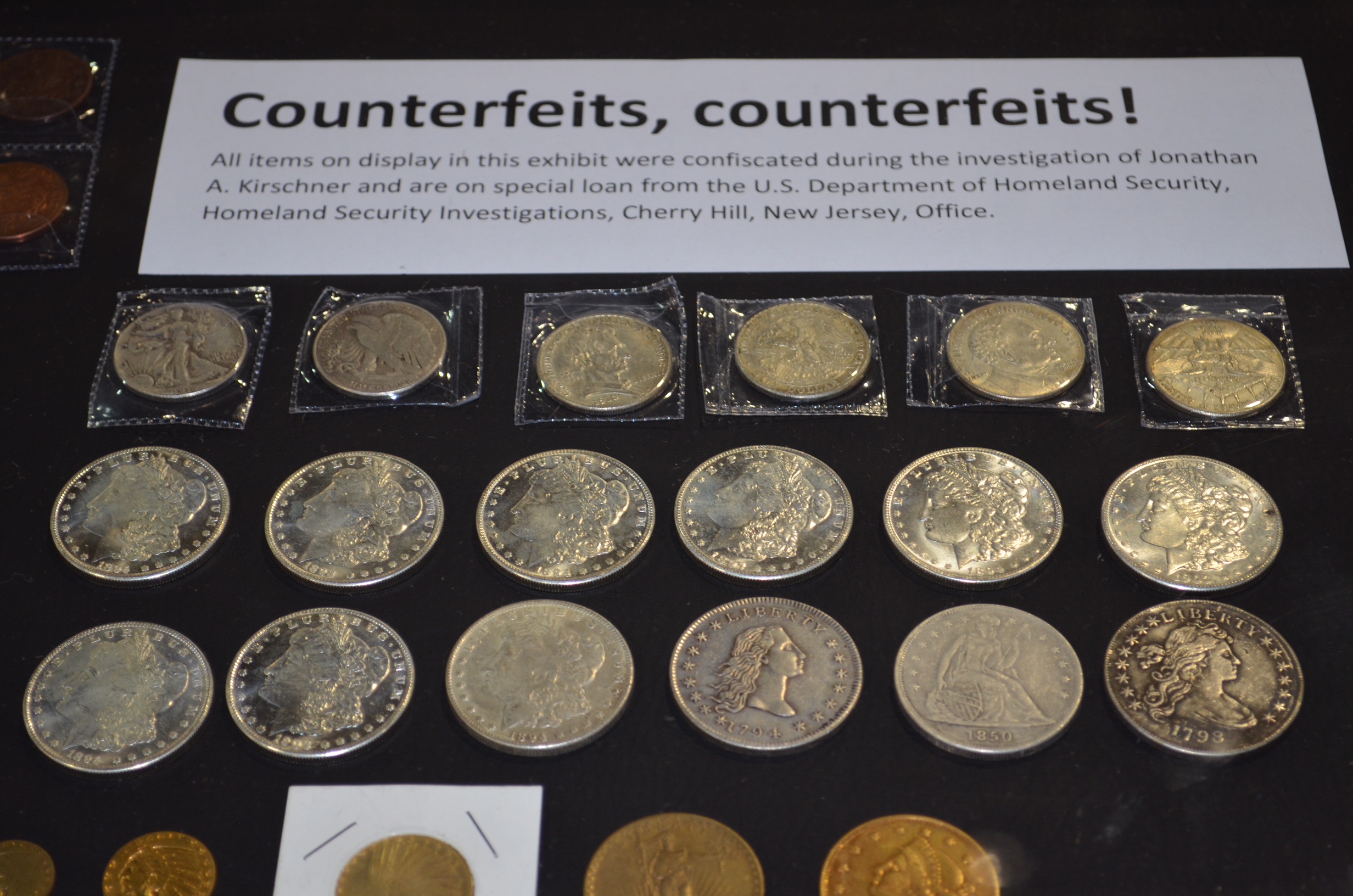
Front of a counterfeit 2012-dated American Eagle $50 denomination one-ounce gold bullion coin. (Photo courtesy of Numismatic Guaranty Corporation.)
Every coin minted by the U.S. Mint is legal tender and are legally an instrument of the government. Although the Trade dollar was demonetized in 1876, it was remonetized as part of the Coinage Act of 1965 making it legal tender (31 U.S.C. § 5103) for trade in the United States. This means that it is legal to spend an 1873 Trade Dollar for $1 of goods and services even though the coin is worth more than its face value.
To protect its currency, the United States has anti-counterfeiting laws that makes it illegal to counterfeit the nation’s money and use in commerce. For collectible coins and currency congress passed and has since updated the the Hobby Protection Act (15 U.S.C. § 2101 et. seq.). These laws protect the money supply when it is a collectible and not an instrument of commerce.
In the United States, laws are cumulative. Once passed, they remain the law until repealed or declared unconstitutional by the courts. This is not the way in many other countries. In many countries, when a new government takes power they are given the authority to rewrite the laws. It is expected to happen within authoritarian governments but it is common in many parliamentary democracies.
The People’s Republic of China has been run by the Communist Party since 1949. Their rules and laws have changed significantly when the Communist Party came into power. One of their first rules was to demonetize the money produced by the Republic of Chin and issued renminbi, the “people’s currency.”
Since then, it has been the practice of the chairman of the Communist Party to demonetize non-current issues of coins and currency as part of their economic control policies. Based on the current Chinese economic system, all coins struck since 1955, the first issued under the current government, are legal tender. Currency printed since 1999, the fifth series is the only legal tender notes. Any other coin or currency note has been demonetized.
Under Chinese anti-counterfeiting laws, it is illegal to duplicate any legal tender coin or currency note for any reason. However, since coinage from previous regimes is no longer legal tender, it is legal to strike coins with those designs. Chinese laws do not recognize the collection of these coins as a market to protect.

An example of a Morgan Dollar cut in half to match a date with a mintmark to have the coin appear something it is not. Coin was in a counterfeit PCGS slab and caught by one of their graders.
Chinese law does not recognize the perpetual legal tender status of every coin issued. Chinese law also recognizes that counterfeiting current issues of other countries is also illegal because someone could try to use the coin in commerce where it is legal to use foreign currency. This means that in China, it would be illegal to reproduce a presidential dollar or Washington quarter, but producing Morgan dollars or a set of 1921 Walking Liberty half-dollars is legal in China because these are coins no longer issued in the United States.
When China is asked to assist the United States to stop the counterfeiting of coins, China does not recognize that its people are doing anything wrong. The coins are no longer being made, they are not in circulation, and their laws allow people to make copies of these coins. The only laws that China has regarding collectibles are laws protecting antiquities and cultural properties. This means that you cannot duplicate a Ming Dynasty vase and try to pass it off as real but it is legal to reproduce a Rembrandt masterpiece since he is not Chinese and his work was not made in China.
A trade attorney that was originally consulted for this article confirmed that when it comes to these issues, Chinese law is very protectionist. The claim is that they follow their laws consistently regardless of outside circumstances and they refuse to make exceptions citing the complication with enforcing their laws in a country with a population of more than 1.3 billion people.

PCGS representatives showed Congressmen counterfeit U.S. coins in counterfeit PCGS holders during their recent meetings in Washington, DC. (Photo courtesy of PCGS.)
The Chinese government has no incentive to help the United States or any other country fight counterfeiting in what is perceived by the Chinese as a small market problem. To put the resources necessary into what looks like a petty crime for selling inexpensive, non-circulating duplicate coins that are within Chinese law to manufacture is considered not worth their resources.
While there is anecdotal evidence that the Chinese government knows about the counterfeit trades and some officials informally support the efforts because they get kickbacks, official Chinese policy denies there is a problem.
A lot has been written about the nature of the relationship between the United States and China since President Richard Nixon’s trip to China in 1972. Neither side trusts each other nor does neither side believe each other. Today, the United States decries the Chinese for buying too much of our debt, allegations of spying, industrial espionage, and cyber crimes. The Chinese say that the United States is trying to bully the world and that these naysayers are making up the stories to scare the world into following them. The United States talks about civil rights violations within the Chinese border and the Chinese government tells the United States to mind its own business.
The greater opening of markets between the country and the increase in popularity of bullion coins has made the Chinese Panda a popular coin amongst collectors and investors. Those of us who buy these coins know that even with the production increases since 2010 new issues continue to command a premium greater than other bullion coins.
While the Chinese are happy to sell coins and be the factory to the United States, there remains an underlying tone of political and commercial hostility between the nations. A trade attorney said that the Chinese would rather keep the relationship to business between the countries that the United States should stay out of China’s domestic policy. It was explained that the Chinese central government was upset over how the United States passed judgment over companies in their high tech electronic manufacturing sector because these companies are doing better and are safer than other Chinese manufacturers. To the Chinese government, it is not a problem if a few workers die for whatever reason. There is an ample supply from the population to keep the plants running.
These are the values of the Chinese government. Whether you agree with them or not, Communist Party officials will resent anyone telling them how to manage their domestic affairs. They want advice about how to treat their citizens as much as the United States wants similar advice from China.
There is no incentive for China to stop the manufacture of counterfeit collectible coins.
It is not against Chinese law for these people to manufacture coins that are no longer in production. Chinese people who are manufacturing these coins are working in China and many employ other people. It means there are fewer people relying on assistance the Chinese government provides. Since they now have incomes, it provides revenues for the tax coffers.
When a United States trade representatives negotiate with their Chinese counterparts, it gives the Chinese a chance to lecture the United States how they resolved the counterfeiting issues which leads to a discussion on currency handling and management, which is a sore subject in the United States since the United States questions Chinese monetary policies.

A portion of the exhibit of confiscated counterfeits on special loan from the Department of Homeland Security displayed at the 2018 World’s Fair of Money® by ICTA/ACTF.
Finally, it gives China a measure of moral superiority against the United States. After all, China figured out a way to prevent the impact of counterfeiting of older currency, why can’t the United States do the same?
China has no incentive to help the United States to solve a problem that they perceive does not exist. It is up to the United States to resolve these issues. This is why the industry promoted the Collectible Coin Protection Act (Public Law No: 113-288) so that law enforcement has an additional tool to use to help prosecute handlers of counterfeit coins in the United States.

